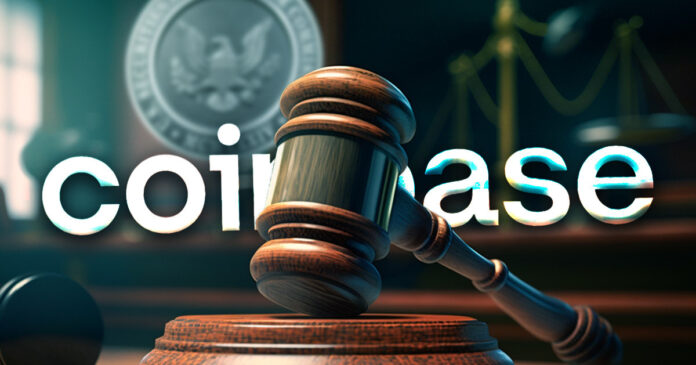On June 6, the U.S. Securities and Exchange Commission (SEC) filed charges against Coinbase, alleging that the company violated securities regulations.
These are the most notable takeaways from those charges.
1. Coinbase operated as an unregistered broker
The SEC said that Coinbase’s main trading platform has operated as an unregistered broker, exchange, and clearing agency since 2019. It also said that the company’s Prime and Wallet services have operated as unregistered brokers since then.
Coinbase’s profits are also raised in the case. The SEC said that Coinbase has earned billions of dollars worth of revenue from transaction fees and alleged that Coinbase prioritized its own revenue over investor interest and legal compliance.
2. Case text primarily concerns third-party listings
The SEC said that Coinbase provided access to existing crypto asset securities. It said that this brings Coinbase “squarely within the purview of the securities laws.”
Those tokens are Solana (SOL), Cardano (ADA), Polygon (MATIC), Filecoin (FIL), The Sandbox (SAND), Axie Infinity (AXS), Chiliz (CHZ), FLOW (FLOW), Internet Computer Protocol (ICP), Near Protocol (NEAR), Voyager (VGX), Dash (DASH), and Nexo (NEXO).
Over 40 pages of the 101-page filing aim to prove that those tokens are securities. Those pages make little mention of Coinbase apart from the fact that it listed the above tokens, meaning that Coinbase’s conduct is not solely at play in the case.
3. Staking services are a security offering
The SEC said that Coinbase’s staking service constitutes an unregistered securities sale and offering in its own right. Coinbase marketed its staking service as an investment opportunity, profited from the service, gave users expectations of profits, and otherwise met the conditions needed for the offering to be considered a security.
Coinbase began to expect that the SEC would target its staking offering in early 2023 and changed its staking model in March. The SEC acknowledged that change by quoting a relevant filing, but did not otherwise provide comment.
4. Coinbase’s Crypto Rating Council backfired
Though Coinbase has operated since 2012, the SEC’s case text considers Coinbase’s activity since 2019 the “relevant period” for its allegations.
This period appears to be relevant because Coinbase greatly increased its listings starting in 2019; it approximately doubled its listings by the end of 2020.
Those listings were driven by the launch of the Coinbase-led Crypto Rating Council (CRC) in 2019. Coinbase used the CRC framework to determine which cryptocurrencies were appropriate for listing. It also used this info to take precautionary measures, even asking one potential listing to revise language “associated with securities.”
However, the SEC said these actions show that Coinbase listed coins that it knew had qualities of securities. As such, its attempts at compliance backfired.
5. Coinbase’s stock listing doesn’t help its case
The SEC noted that it approved a public stock offering from Coinbase’s parent company, CGI. The company’s stock began trading as COIN on April 14, 2021.
Coinbase executives have repeatedly said that this successful stock listing is a sign that of SEC approval — including a recent tweet in which CEO Brian Armstrong says that the SEC “reviewed our business and allowed us to become a public company in 2021.”
The SEC countered this and said that its approval of a stock offering is not an “opinion on, or endorsement of, the legality of an issuer’s underlying business.” Furthermore, it said that CGI acknowledged securities-related risks in its earlier stock filings.
6. Charges only partially resemble Binance’s case
The SEC’s charges against Coinbase are similar in some ways to its charges against Binance. The regulator similarly accused Binance of failure to register. Its complaint also contained large sections on listings of third-party cryptocurrencies.
However, the SEC also alleged that Binance and its U.S. counterparts permitted users to bypass geoblocking, engaged in fraud, allowed wash trading, and failed to separate U.S. and global operations. The SEC did not make equivalent allegations against Coinbase.
The SEC also charged Binance CEO Changpeng Zhao directly and named him as a defendant. It did not charge any Coinbase executives in the relevant case.
7. SEC wants injunctions and penalties
The SEC said that it wants Coinbase and its members enjoined (or prevented) from violating the Securities Act and Exchange Act.
The regulator also said that wants Coinbase to be ordered to disgorge its ill-gotten gains and pay civil penalties; it also left room to request further relief. It did not state how much Coinbase could be made to pay in penalties and disgorgement.
It is unclear how these charges and demands will affect Coinbase’s day-to-day business. Coinbase has repeatedly stated that it intends to fight the SEC in court.
Credit: Source link






















 Bitcoin
Bitcoin  Ethereum
Ethereum  XRP
XRP  Tether
Tether  Solana
Solana  USDC
USDC  Dogecoin
Dogecoin  Cardano
Cardano  Lido Staked Ether
Lido Staked Ether  TRON
TRON  Wrapped Bitcoin
Wrapped Bitcoin  Wrapped stETH
Wrapped stETH  Chainlink
Chainlink  Avalanche
Avalanche  Sui
Sui  Stellar
Stellar  Litecoin
Litecoin  Toncoin
Toncoin  Shiba Inu
Shiba Inu  Hedera
Hedera  LEO Token
LEO Token  USDS
USDS  Hyperliquid
Hyperliquid  WETH
WETH  Polkadot
Polkadot  MANTRA
MANTRA  Bitcoin Cash
Bitcoin Cash  Bitget Token
Bitget Token  Ethena USDe
Ethena USDe  Wrapped eETH
Wrapped eETH  Uniswap
Uniswap  Monero
Monero  NEAR Protocol
NEAR Protocol  Pepe
Pepe  WhiteBIT Coin
WhiteBIT Coin  Aave
Aave  Ondo
Ondo  Bittensor
Bittensor  Aptos
Aptos  Internet Computer
Internet Computer  Dai
Dai  Official Trump
Official Trump  Mantle
Mantle  Ethereum Classic
Ethereum Classic  Tokenize Xchange
Tokenize Xchange  OKB
OKB  Gate
Gate  sUSDS
sUSDS  Coinbase Wrapped BTC
Coinbase Wrapped BTC 
